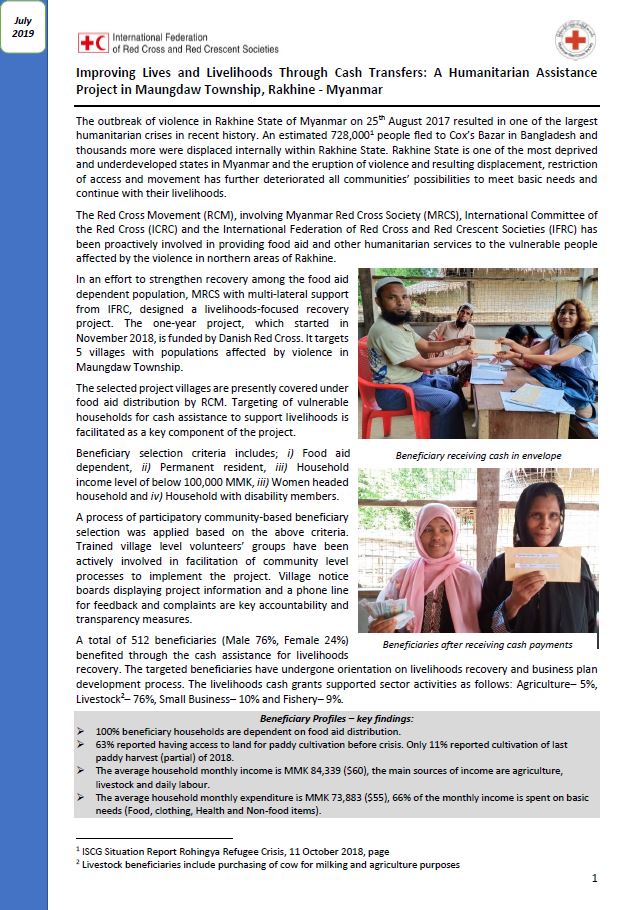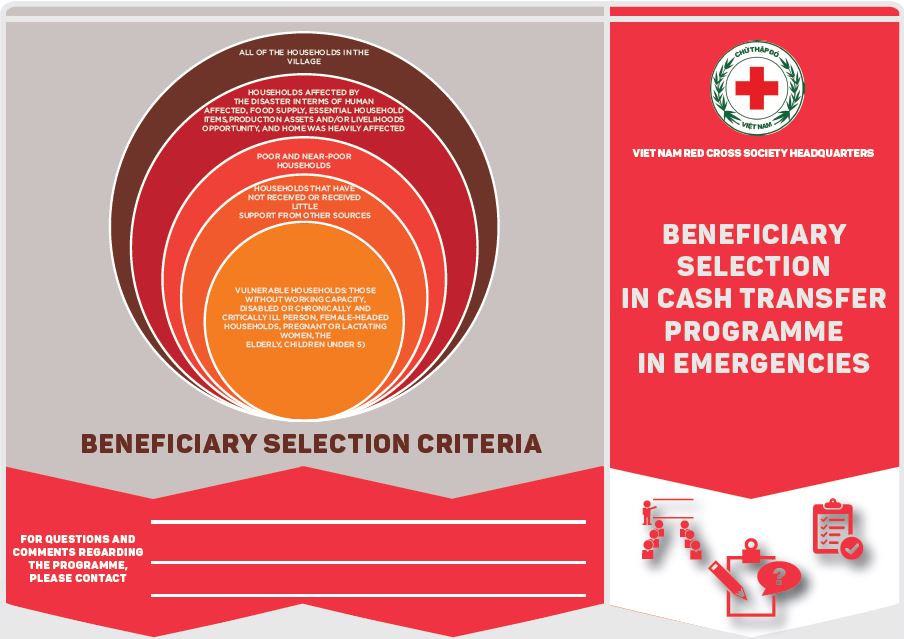Case Study: Position Paper on Cash-Based Intervention by Viet Nam Red Cross
The Viet Nam Red Cross Society (VNRC) is one of the leading humanitarian organization in Viet Nam with clear roles in responding to disaster and emergency situation. As an auxiliary to the government, VNRC works closely with the government structures at national, provincial and community level to provide assistance to vulnerable household affected by disasters. In this capacity, it is recognized as the first
agency to deliver much needed relief and support the long-term recovery of disaster affected populations in the areas of food, non-food items, water, hygiene and sanitation, livelihoods and shelter.
The use of cash has a long history in humanitarian development and emergency programming in Viet Nam. It has increasingly become a preferred emergency response option in addition to distribution of household kits and provision of food and non-food items. There is a growing evidence that cash-based intervention (CBI) is an effective modality to meet humanitarian needs of the disaster affected communities. However, there is still much scope for improvement of CBI approaches in Viet Nam.
This paper provides an overview of the increasing use of CBIs by VNRC in emergency operations and highlights the current initiatives taken by VNRC to improve capacity of the National Society for future large-scale responses.
![]()
Improving Lives and Livelihoods Through Cash Transfer: A Humanitarian Assistance Project in Maungdaw Township, Rakhine-Myanmar
The outbreak of violence in Rakhine State of Myanmar on 25 August 2017 resulted in one of the largest humanitarian crises in recent history. An estimated 728,000 people fled to Cox’s Bazar in Bangladesh and thousands more were displaced internally within Rakhine State. Rakhine State is one of the most deprived and underdeveloped states in Myanmar and the eruption of violence and resulting displacement, restriction of access and movement has further deteriorated all communities’ possibilities to meet basic needs and continue with their livelihoods.
The Red Cross Movement (RCM), involving Myanmar Red Cross Society (MRCS), International Committee of the Red Cross (ICRC) and the International Federation of Red Cross and Red Crescent Societies (IFRC) has been proactively involved in providing food aid and other humanitarian services to the vulnerable people affected by the violence in northern areas of Rakhine.
In an effort to strengthen recovery among the food aid dependent population, MRCS with multi-lateral support from IFRC, designed a livelihoods-focused recovery project. The one-year project, which started in November 2018, is funded by Danish Red Cross. It targets 5 villages with populations affected by violence in Maungdaw Township.
![]()
Viet Nam Red Cross Conducts Financial Service Provider Simulation Exercise | 4-5 June 2019 | Quang Tri, Viet Nam
The simulation was conducted in five communes in Quang Tri province between 4 and 5 June 2019. In total, 1,013 people who are poor and nearly poor were selected to participate in the piloting. Each person received VND 250,000 (CHF 10.5) as allowance for their travel cost (petrol) and/or their wages. Out of the total number of beneficiaries, 428 persons registered with Viettel, while 585 others accessed the Post Office service, both of which are financial service providers (FSPs).
The simulation is part of the project “Cash Preparedness Initiative” implemented by selected National Societies with the technical support from IFRC. The goal of the Asia Cash Preparedness initiative is for Viet Nam Red Cross (VNRC) to have the capacity and the ability to use cash transfer programming in emergencies, recovery and resilience activities in a faster and more scalable way.
The simulation observed the following:
- Distribution sites were well set up;
- Both FSPs were efficient and familiar with their services.
- Encashment went very well. Staff of the two FSPs showed good attitude and patience to beneficiaries, particularly with those who have no experience with using ATM card (with Viettel) and who are proxy (with Post Office).
- Cooperation and support from the local authority was provided. In some communes, desks were arranged so that local authority leader could verify the relationship between the beneficiaries and their proxy.
- Distribution tickets were handed over to beneficiaries between 1 to 2 days prior to the distribution. At the distribution site, PO distributed cash in envelops. They managed from validation to distribution. Given their experience with other organizations, PO can distribute to 120 people within one hour with a team of 6 distributors and validators and 2 site managers. Reconciliation was done at end of each distribution with signatures of VNRC, PO and local authorities.
- Logos of VNRC, purpose of the cash, role of VNRC (cash supported by VNRC) and PO (as distributor) are indicative in the envelope containing cash provided to beneficiaries. However, there is no VNRC logo in the distribution ticket. This needs to be improved in the future. Proxy needs verification by local authority leaders.
- Viettel Pay set up mobile counters at each commune where they handed over the ATM cards and helped beneficiaries to encash out directly with them. SMS message was sent to beneficiary’s phone numbers to update balance in their accounts (auto message). In addition, ViettelPay supported (free) another message informing the date, time and place where people can encash out. It took around three hours for ViettelPay to complete distribution to around 100 beneficiaries. Proxy was accepted with ID and mobile phone of beneficiaries plus the proxy’s ID. It was observed that around 90% of beneficiaries accessed accounts/ATM cards for the first time.
- Beneficiary exist survey were conducted at each distribution site by volunteers, using KOTO TOOLBOX. In total, 168 beneficiaries were interviewed. See below for further details.
- In total, 581 out of 588 beneficiaries received cash through PO. 7 beneficiaries moved to other places. As with Viettel, 412 out of 425 people have received ATM and encashed out. Viettel handed the rest of 13 ATM cards to Red Cross commune staff who will deliver them to the beneficiaries who did not show up in the distribution.
![]()
Viet Nam Red Cross Conducts Minimum Expenditure Basket Workshop | 24-26 April 2019 | Hanoi, Viet Nam
Cash & Vouchers Assistance (CVA) has increasingly become a preferred option in humanitarian response in Viet Nam. Various stakeholders including UNDP, FAO, IOM, UN Women, IFRC, Viet Nam Red Cross (VNRC), Catholic Relief Service (CRS) and Save the Children have addressed needs of disaster affected people through CVA. In 2017 alone, most of the funding from UN Central Emergency Response Fund (CERF) was allocated to CVA interventions.
There are different approaches to CVA in terms of transfer values and targeting processes. Being cognizant of global and local trends towards coherent and coordinated approaches toward CVA to optimize resources, the in-country Cash Working Group (CWG) was created. The group aims to organise a platform of stakeholders engaged in CVA to exchange experiences and knowledge, communicate best practices and lesson learned on CVA, as well as to seek harmonization of CVA approaches both in terms of process and transfer value. To achieve this, apart from regular coordination meetings, the CWG proposes capacity building for its members, particularly on market assessments and calculation of transfer values.
To carry it forward, IFRC/VNRC and FAO jointly organized the Minimum Expenditure Basket (MEB) Workshop in Hanoi between 24 and 26 April with 17 participants (10 female) from VNRC, Swiss Red Cross, UNDP, UNICEF, CRS, Care International, World Vision and Plan International. The Regional cash working group (IFRC and CaLP) provided technical support. The workshop provided common understanding on MEB and transfer value calculation following disaster and crisis. The next steps will be the consultation with cluster specialists to finalize the MEB (e.g. shelter, WASH and food security) so that it has the input from the different sectors. This workshop, coupled with field work, is expected to harmonize the calculation of transfer values in humanitarian programmes and to harmonize the methodology and amounts actually delivered to beneficiaries. The workshop objectives are i) to enhance capacity on market assessment for CWG members and ii) o propose MEB which is mutually agreed among stakeholders within the CWG.
![]()
Viet Nam Red Cross Conducts Training on Cash & Data Management | 5-8 March 2019 | Ha Noi, Viet Nam
Viet Nam Red Cross society (VNRC) is implementing a cash preparedness project since the past year which paves the way to acceptance of cash as one of their aid delivery modalities from emergency response to recovery and long-term development. Significant key achievements have been noted as manifested in the successful completion of several cash in emergency DREF responses and finalization of the VNRC’s CVA position paper among others. Results of external evaluations and the midterm review conducted last November 2018 revealed the little use VNRC makes of new technologies in general, digital means for data collection and management, such as tablets and mobile phones. As a result, considerable amount of time is spent on beneficiary data entry and sanitising the excel document to comply with data quality requirements. These bottlenecks affect the desired speed and over-all effectiveness of the assistance. VNRC will soon start delivering cash assistance though financial service provider to process fund transfers which further compounds the need for timely collection and management of data meeting the required quality standards.
To move forward, a 5-day workshop were organized in Ha Noi from 5th to 8th March 2019 with participation 32 people (12 female) from VNRC, IFRC, Swiss Red Cross, American Red Cross, government disaster management agency, Save the Children, and Catholic Relief Services. The training was facilitated by the IFRC and Swiss Red Cross.
The purpose of the training to build the capacity of VNRC staff by understanding and practically apply mobile data collection and management tools which will be rapidly deployed in response to emergencies. This training also attempted to link mobile data collection systems to beneficiary registration and monitoring in VNRC.
Evaluation from participants:
Overall it seems that participants were satisfied with the workshop as an introduction to digital data collection and management. Data literacy has strong links to other areas of work such as monitoring and reporting which were also of interest for participants but the time available was insufficient.
Next steps:
It is important that VNRC staff could practice the use of the digital tools in the scenario which is planned to take place in May so that data is collected with RR
Collect, managed with the RR platform and then linked to the FSP for cash distribution. Then VNRC can complete the learning cycle and put into practice what has been taught in the training.
![]()
Cash Transfer Programme in Emergencies – Beneficiary Selection (Brochure)
Purpose and overview:
The brochure is used in cash transfer programming in disaster to reflect the transparency and accountability in beneficiary selection process.
Usage: To increase awareness
Audience: National Society staff and volunteers and community
See also: For Vietnamese version click here Tiếng Việt [pdf, 6 MB]
This publication is part of the Cash Transfer Programmming (CTP) quick guide series which also consists of:
- Beneficiary Selection (Poster) [pdf, 1.3 MB], Vietnamese version [pdf, 1 MB]
- Cash Transfer Programme (Booklet) [pdf, 3.6 MB], Vietnamese version [pdf, 4 MB]
![]()



